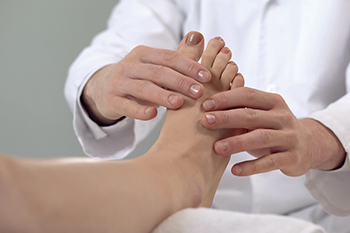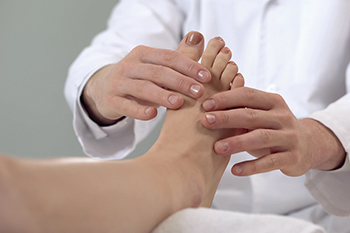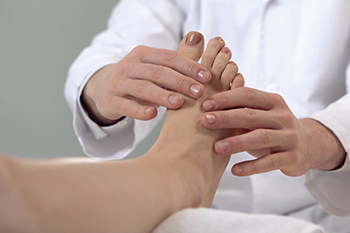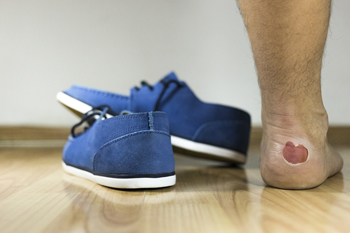Items filtered by date: September 2022
Swelling of the Feet in Hot Weather

When your feet become swollen, bodily fluids accumulate in the feet and ankles, which can make your skin look puffy and cause sensations of stiffness when putting weight on the feet. Swelling of the feet has numerous causes, however one often overlooked cause is hot weather. Some individuals might be particularly susceptible to what is known as heat edema, which is essentially swelling that comes about when standing for a prolonged period of time in hot environments. To avoid heat edema, you might consider keeping your body cooler in temperature by staying in the shade when outdoors. Additionally, it might be important to stay hydrated by drinking a sufficient amount of water to combat heat edema. This is done to reduce your body's concentration of salt and can ultimately lower your retention of bodily fluids. Contact a podiatrist today to learn more about heat edema and feet swelling in hot weather.
Swollen feet can be a sign of an underlying condition. If you have any concerns, contact Dr. Joshua David Scoll of Pennsylvania. Our doctor can provide the care you need to keep you pain-free and on your feet.
Swollen feet are a common ailment among pregnant women and people who stand or sit for extended periods. Aging may increase the possibility of swollen feet and patients who are obese often notice when their feet are swelling too. There may be medical reasons why swollen feet occur:
- Phlebitis - A condition that causes the veins to become inflamed and can also cause leg pain.
- Liver disease - This may lead to low blood levels of albumin which is a protein. This can cause fluid in the blood to pass into the tissues and several areas of the body can become swollen.
- Heart failure - When the heart doesn’t pump properly the blood that is normally pumped back to the heart can pool in the veins of the legs causing swollen feet.
- Kidney disease - One of the main functions of the kidneys is releasing excess fluid in the body. This type of condition can make it difficult for the kidneys to function properly, and as a result the feet may become swollen.
- Deep-vein thrombosis (DVT)- This is a serious condition where blood clots form in the veins of the legs. They can block the return of blood from the legs to the heart which may cause the feet to swell. It is important to be treated by a podiatrist if this condition is present.
Swollen feet can also be caused by bone and tendon conditions, including fractures, arthritis, and tendinitis. Additionally, there may be skin and toenail conditions and an infection may cause the feet to swell. Patients who take medicine to treat high blood pressure may be prone to getting swollen feet.
Many patients elevate their feet to help relieve the swelling and this is generally a temporary remedy. When a podiatrist is consulted the reason behind the swelling can be uncovered and subsequently treated.
If you have any questions please feel free to contact one of our offices located in Philadelphia and Bensalem, PA . We offer the newest diagnostic tools and technology to treat your foot and ankle needs.
Swelling of the Feet in Hot Weather

When your feet become swollen, bodily fluids accumulate in the feet and ankles, which can make your skin look puffy and cause sensations of stiffness when putting weight on the feet. Swelling of the feet has numerous causes, however one often overlooked cause is hot weather. Some individuals might be particularly susceptible to what is known as heat edema, which is essentially swelling that comes about when standing for a prolonged period of time in hot environments. To avoid heat edema, you might consider keeping your body cooler in temperature by staying in the shade when outdoors. Additionally, it might be important to stay hydrated by drinking a sufficient amount of water to combat heat edema. This is done to reduce your body's concentration of salt and can ultimately lower your retention of bodily fluids. Contact a podiatrist today to learn more about heat edema and feet swelling in hot weather.
Swollen feet can be a sign of an underlying condition. If you have any concerns, contact Dr. Joshua David Scoll of Pennsylvania. Our doctor can provide the care you need to keep you pain-free and on your feet.
Swollen feet are a common ailment among pregnant women and people who stand or sit for extended periods. Aging may increase the possibility of swollen feet and patients who are obese often notice when their feet are swelling too. There may be medical reasons why swollen feet occur:
- Phlebitis - A condition that causes the veins to become inflamed and can also cause leg pain.
- Liver disease - This may lead to low blood levels of albumin which is a protein. This can cause fluid in the blood to pass into the tissues and several areas of the body can become swollen.
- Heart failure - When the heart doesn’t pump properly the blood that is normally pumped back to the heart can pool in the veins of the legs causing swollen feet.
- Kidney disease - One of the main functions of the kidneys is releasing excess fluid in the body. This type of condition can make it difficult for the kidneys to function properly, and as a result the feet may become swollen.
- Deep-vein thrombosis (DVT)- This is a serious condition where blood clots form in the veins of the legs. They can block the return of blood from the legs to the heart which may cause the feet to swell. It is important to be treated by a podiatrist if this condition is present.
Swollen feet can also be caused by bone and tendon conditions, including fractures, arthritis, and tendinitis. Additionally, there may be skin and toenail conditions and an infection may cause the feet to swell. Patients who take medicine to treat high blood pressure may be prone to getting swollen feet.
Many patients elevate their feet to help relieve the swelling and this is generally a temporary remedy. When a podiatrist is consulted the reason behind the swelling can be uncovered and subsequently treated.
If you have any questions please feel free to contact one of our offices located in Philadelphia, Bensalem, and Fairless Hills, PA . We offer the newest diagnostic tools and technology to treat your foot and ankle needs.
How to Deal With Corns

A corn is a thickened area of the skin, usually on the foot, that is the result of friction from the inside of a shoe. It can have a soft or hard inner core. Hard corns generally form on top of a toe, while soft corns develop between the toes. Corns on the feet are formed from repeated pressure, which causes the skin to die and harden. A hard corn is tough and thick, often with a hard center that can cause pain if pressure, or friction, is prolonged. Moisture between the toes allows corns to soften. A soft corn looks more like an open sore, as the compressed toes rub against each other within the shoe. Changing footwear to give the toes and feet more room is the first way to avoid getting a corn. Several protective pads are available in retail stores. However, if a corn is causing extreme pain, it is a good idea to visit a podiatrist to have it examined and safely removed.
If you have any concerns regarding your feet and ankles, contact Dr. Joshua David Scoll of Pennsylvania. Our doctor will treat your foot and ankle needs.
Corns: What Are They? and How Do You Get Rid of Them?
Corns can be described as areas of the skin that have thickened to the point of becoming painful or irritating. They are often layers and layers of the skin that have become dry and rough, and are normally smaller than calluses.
Ways to Prevent Corns
There are many ways to get rid of painful corns such as wearing:
- Well-fitting socks
- Comfortable shoes that are not tight around your foot
- Shoes that offer support
Treating Corns
Treatment of corns involves removing the dead skin that has built up in the specific area of the foot. Consult with Our doctor to determine the best treatment option for your case of corns.
If you have any questions please feel free to contact one of our offices located in Philadelphia and Bensalem, PA . We offer the newest diagnostic and treatment technologies for all your foot and ankle needs.
How to Deal With Corns

A corn is a thickened area of the skin, usually on the foot, that is the result of friction from the inside of a shoe. It can have a soft or hard inner core. Hard corns generally form on top of a toe, while soft corns develop between the toes. Corns on the feet are formed from repeated pressure, which causes the skin to die and harden. A hard corn is tough and thick, often with a hard center that can cause pain if pressure, or friction, is prolonged. Moisture between the toes allows corns to soften. A soft corn looks more like an open sore, as the compressed toes rub against each other within the shoe. Changing footwear to give the toes and feet more room is the first way to avoid getting a corn. Several protective pads are available in retail stores. However, if a corn is causing extreme pain, it is a good idea to visit a podiatrist to have it examined and safely removed.
If you have any concerns regarding your feet and ankles, contact Dr. Joshua David Scoll of Pennsylvania. Our doctor will treat your foot and ankle needs.
Corns: What Are They? and How Do You Get Rid of Them?
Corns can be described as areas of the skin that have thickened to the point of becoming painful or irritating. They are often layers and layers of the skin that have become dry and rough, and are normally smaller than calluses.
Ways to Prevent Corns
There are many ways to get rid of painful corns such as wearing:
- Well-fitting socks
- Comfortable shoes that are not tight around your foot
- Shoes that offer support
Treating Corns
Treatment of corns involves removing the dead skin that has built up in the specific area of the foot. Consult with Our doctor to determine the best treatment option for your case of corns.
If you have any questions please feel free to contact one of our offices located in Philadelphia, Bensalem, and Fairless Hills, PA . We offer the newest diagnostic and treatment technologies for all your foot and ankle needs.
Are Bunions Affecting Your Everyday Life?
Are Bunions Affecting Your Everyday Life?
People Who Have a Fear of Falling May Lose Interest in Exercising

The simple mishap of slipping on the floor or tripping on a rug can cause many injuries, including unwanted foot conditions. A fall may result in a broken foot or sprained ankle, and this may complicate daily living. Falling is a common occurrence among elderly people, and it may instill a fear of completing everyday activities. This fear of falling may lead to refraining from participating in an exercise program, which may cause the muscles to lose strength. There are several things that can cause falling to occur, in addition to simple methods that can be implemented which can help to prevent them. These can include scheduling regular physical and eye examinations that can update existing medications and eyeglasses, and removing frayed rugs from the living environments. Additionally, many seniors choose to have grab bars installed in the shower and toilet areas, and it can help to use a bathmat. If you would like more information about the importance of using effective fall prevention techniques, please schedule an appointment with a podiatrist who can answer any questions you may have.
Preventing falls among the elderly is very important. If you are older and have fallen or fear that you are prone to falling, consult with Dr. Joshua David Scoll from Pennsylvania. Our doctor will assess your condition and provide you with quality advice and care.
Every 11 seconds, an elderly American is being treated in an emergency room for a fall related injury. Falls are the leading cause of head and hip injuries for those 65 and older. Due to decreases in strength, balance, senses, and lack of awareness, elderly persons are very susceptible to falling. Thankfully, there are a number of things older persons can do to prevent falls.
How to Prevent Falls
Some effective methods that older persons can do to prevent falls include:
- Enrolling in strength and balance exercise program to increase balance and strength
- Periodically having your sight and hearing checked
- Discuss any medications you have with a doctor to see if it increases the risk of falling
- Clearing the house of falling hazards and installing devices like grab bars and railings
- Utilizing a walker or cane
- Wearing shoes that provide good support and cushioning
- Talking to family members about falling and increasing awareness
Falling can be a traumatic and embarrassing experience for elderly persons; this can make them less willing to leave the house, and less willing to talk to someone about their fears of falling. Doing such things, however, will increase the likelihood of tripping or losing one’s balance. Knowing the causes of falling and how to prevent them is the best way to mitigate the risk of serious injury.
If you have any questions, please feel free to contact one of our offices located in Philadelphia and Bensalem, PA . We offer the newest diagnostic and treatment technologies for all your foot care needs.
People Who Have a Fear of Falling May Lose Interest in Exercising

The simple mishap of slipping on the floor or tripping on a rug can cause many injuries, including unwanted foot conditions. A fall may result in a broken foot or sprained ankle, and this may complicate daily living. Falling is a common occurrence among elderly people, and it may instill a fear of completing everyday activities. This fear of falling may lead to refraining from participating in an exercise program, which may cause the muscles to lose strength. There are several things that can cause falling to occur, in addition to simple methods that can be implemented which can help to prevent them. These can include scheduling regular physical and eye examinations that can update existing medications and eyeglasses, and removing frayed rugs from the living environments. Additionally, many seniors choose to have grab bars installed in the shower and toilet areas, and it can help to use a bathmat. If you would like more information about the importance of using effective fall prevention techniques, please schedule an appointment with a podiatrist who can answer any questions you may have.
Preventing falls among the elderly is very important. If you are older and have fallen or fear that you are prone to falling, consult with Dr. Joshua David Scoll from Pennsylvania. Our doctor will assess your condition and provide you with quality advice and care.
Every 11 seconds, an elderly American is being treated in an emergency room for a fall related injury. Falls are the leading cause of head and hip injuries for those 65 and older. Due to decreases in strength, balance, senses, and lack of awareness, elderly persons are very susceptible to falling. Thankfully, there are a number of things older persons can do to prevent falls.
How to Prevent Falls
Some effective methods that older persons can do to prevent falls include:
- Enrolling in strength and balance exercise program to increase balance and strength
- Periodically having your sight and hearing checked
- Discuss any medications you have with a doctor to see if it increases the risk of falling
- Clearing the house of falling hazards and installing devices like grab bars and railings
- Utilizing a walker or cane
- Wearing shoes that provide good support and cushioning
- Talking to family members about falling and increasing awareness
Falling can be a traumatic and embarrassing experience for elderly persons; this can make them less willing to leave the house, and less willing to talk to someone about their fears of falling. Doing such things, however, will increase the likelihood of tripping or losing one’s balance. Knowing the causes of falling and how to prevent them is the best way to mitigate the risk of serious injury.
If you have any questions, please feel free to contact one of our offices located in Philadelphia, Bensalem, and Fairless Hills, PA . We offer the newest diagnostic and treatment technologies for all your foot care needs.
How Did I Get a Blister on My Foot?

Anyone who enjoys running knows the annoyance of having a blister on their foot. It happens as a result of excess friction that can come from wearing shoes and socks that do not fit correctly. This can damage the skin, and a blister will form over the raw skin as new skin develops underneath it. It is filled with a protective fluid, and will gradually drain as the new skin forms. Blisters can make it difficult to walk, exercise, or stand for extended periods of time, and may be covered with a bandage to prevent premature draining. There are medical conditions many people have that may lead to getting blisters. These can include fungal infections, chickenpox, and eczema. Additionally, blisters may develop from an allergic reaction to an insect bite, or possibly from chemical exposure. It is ideal to prevent blisters from occurring, and this may be done by wearing shoes that fit correctly, applying foot powder to shoes and socks, and wearing socks that can absorb moisture. If you would like more information about how to treat and prevent blisters on the feet, please consult with a podiatrist.
Blisters may appear as a single bubble or in a cluster. They can cause a lot of pain and may be filled with pus, blood, or watery serum. If your feet are hurting, contact Dr. Joshua David Scoll of Pennsylvania. Our doctor can provide the care you need to keep you pain-free and on your feet.
Foot Blisters
Foot blisters are often the result of friction. This happens due to the constant rubbing from shoes, which can lead to pain.
What Are Foot Blisters?
A foot blister is a small fluid-filled pocket that forms on the upper-most layer of the skin. Blisters are filled with clear fluid and can lead to blood drainage or pus if the area becomes infected.
Symptoms
(Blister symptoms may vary depending on what is causing them)
- Bubble of skin filled with fluid
- Redness
- Moderate to severe pain
- Itching
Prevention & Treatment
In order to prevent blisters, you should be sure to wear comfortable shoes with socks that cushion your feet and absorb sweat. Breaking a blister open may increase your chances of developing an infection. However, if your blister breaks, you should wash the area with soap and water immediately and then apply a bandage to the affected area. If your blisters cause severe pain it is important that you call your podiatrist right away.
If you have any questions, please feel free to contact one of our offices located in Philadelphia and Bensalem, PA . We offer the newest diagnostic and treatment technologies for all your foot care needs.
How Did I Get a Blister on My Foot?

Anyone who enjoys running knows the annoyance of having a blister on their foot. It happens as a result of excess friction that can come from wearing shoes and socks that do not fit correctly. This can damage the skin, and a blister will form over the raw skin as new skin develops underneath it. It is filled with a protective fluid, and will gradually drain as the new skin forms. Blisters can make it difficult to walk, exercise, or stand for extended periods of time, and may be covered with a bandage to prevent premature draining. There are medical conditions many people have that may lead to getting blisters. These can include fungal infections, chickenpox, and eczema. Additionally, blisters may develop from an allergic reaction to an insect bite, or possibly from chemical exposure. It is ideal to prevent blisters from occurring, and this may be done by wearing shoes that fit correctly, applying foot powder to shoes and socks, and wearing socks that can absorb moisture. If you would like more information about how to treat and prevent blisters on the feet, please consult with a podiatrist.
Blisters may appear as a single bubble or in a cluster. They can cause a lot of pain and may be filled with pus, blood, or watery serum. If your feet are hurting, contact Dr. Joshua David Scoll of Pennsylvania. Our doctor can provide the care you need to keep you pain-free and on your feet.
Foot Blisters
Foot blisters are often the result of friction. This happens due to the constant rubbing from shoes, which can lead to pain.
What Are Foot Blisters?
A foot blister is a small fluid-filled pocket that forms on the upper-most layer of the skin. Blisters are filled with clear fluid and can lead to blood drainage or pus if the area becomes infected.
Symptoms
(Blister symptoms may vary depending on what is causing them)
- Bubble of skin filled with fluid
- Redness
- Moderate to severe pain
- Itching
Prevention & Treatment
In order to prevent blisters, you should be sure to wear comfortable shoes with socks that cushion your feet and absorb sweat. Breaking a blister open may increase your chances of developing an infection. However, if your blister breaks, you should wash the area with soap and water immediately and then apply a bandage to the affected area. If your blisters cause severe pain it is important that you call your podiatrist right away.
If you have any questions, please feel free to contact one of our offices located in Philadelphia, Bensalem, and Fairless Hills, PA . We offer the newest diagnostic and treatment technologies for all your foot care needs.

